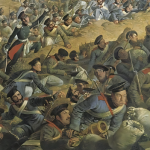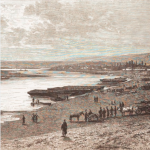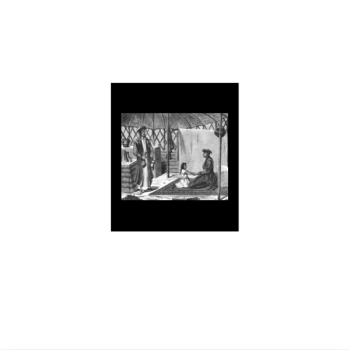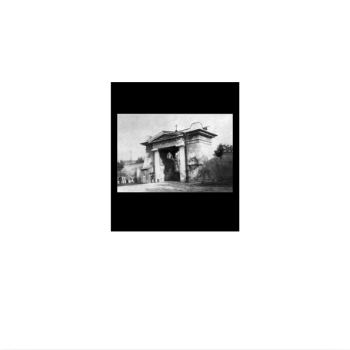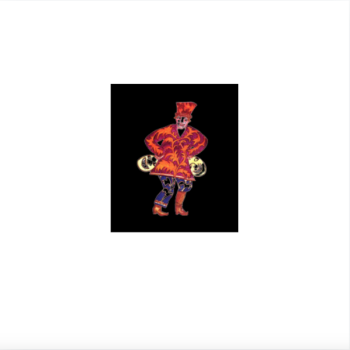LAST WORDS Of SAMUEL KHRISTIANOVICH KONTENIUS
Elena Pavlovna’s illness prevented her from being as actively engaged with the upbringing of her children as she had wished. At the same time, Helena Andreevna, now fourteen years old, began to feel some independence. All of this greatly influenced the impressionable girl, as many of the heroines of her future stories experience a spiritual turning point precisely at the age of thirteen. The future writer lived at this time with varied and, and not entirely childish interests. Images of ancient heroes and their great exploits floated around in her imagination. Plutarch, the deeds of great people, and world historic events enflamed her thoughts. Her friends’ favorite pastime was listening to her tales. Helena Andreevna would stand among them like an ancient bard or a modern improviser, and recite a legend, a poetic story, or a humorous scene from life (depending on the inspiration of the moment.) She was asked (many times) to write down these charming improvisations, but she laughingly refused, assuring that she would not dare describe “all the nonsense” that filled her imagination.[1]
In 1829, Andrei Mikhailovich traveled to Crimea twice. The second time was with Helena Andreevna and her friend from St. Petersburg, Natalya Kuzovleva.[2] They drove along the entire southern coast, partly along the newly constructed highway. That same fall, on September 21, Nadezhda Andreevna Fadeev was born.[3] Memories from that trip, and the majestic views, would sustain Helena Andreevna during droughts of happiness. Mountains adjoining the semi-circular sea formed a deep valley that seemed like one beautiful garden. The undulating soil of the earth rose and fell, rolling down to the seashore; vineyards spread along the hills; poplars, chestnut, and mulberry trees intertwined with vines of wild grapes and surrounded the gardens with a living fence. The bright mountain springs cut them in all directions, getting lost in the bushes, while the invisible ones gurgled unseen before running out into the wild again, flowing over the stones and into the sea. High above rose the gray jagged cliff, shading the children of the south with his broad chest, it seemed to admire the eternal spring, the evergreen ones that grew and bloomed under his protection in the gardens in the depths of the valley. From the very waves rose another cliff, not so high but remarkable in its inaccessibility, piling upon a ledge, it resembled a sugarloaf. On three sides it was encircled by the walls and towers of an ancient Genoese fortress, on the fourth it fell steeply into the sea. The pointed top of the cliff was a crowned tower with round vaults and at that time contained many other remarkable ruins of the remains of a once luxurious city.[4]
Helena Andreevna was nearly sixteen years old and considered the prettiest girl in Ekaterinoslav. She had dark eyebrows, brown hair, a slightly aquiline nose (with a small hump) with charmingly contoured lips. But especially beautiful were her lively brown eyes, the extraordinary mobility of her thin features, and her gentle smile, sometimes mocking, always expressive. Her whole being, it was said, breathed life and beauty, especially so when she sat at the piano, reveled in the sounds of music, and sang a suitable song to suit one’s mood, with her youthful enthusiasm.[5] Such airs filled the cozy rooms in December and January. Old village Christmases were still celebrated at this time, with the “bear and the goat,” the “horn players,” and the gypsy fortune teller; with the mad ride in troikas through snowdrifts, with the accompaniment of bells, jingles, accordions, balalaikas, and sometimes even gunshots (to meet the wolves that accompanied their train from the forest.) For the Fadeev household, it was a time of jollity and good wishes, kindness, merry-making, forgiveness, and charity. It was also match-making season.
In Russia, certain folk magic coexisted with Christianity, leaving the Russian mind predisposed to syncretism and independent mystical experience. Even though such practices were not officially sanctioned by the Orthodox Church, individuals were not discouraged from engaging in personal mystical expression.[6] In the happy backwaters of the empire, the tradition of Rus Christmastide fortune-telling was kept alive by teenage girls who would dream of their future husbands.[7] One popular method was to go outside of their houses and ask the name of the first person they met. The answer gave them the name of the person to whom they were to be married. (Many a pretty girl went blushing to her pillow and dreamed a sweet, troubled dream on that night.) Fortune telling was a prime thing on a New Year’s Eve, and cards handled by young fingers told delicious secrets. The ways of telling fortunes were many. Sometimes the names of young ladies and gentlemen were written on loaves of bread. Then a brisk little hungry dog was called to eat them up. Those whose names were written on the loaves that the little dog gobbled up were said to be married before the year was out. Sometimes a rooster was the preferred animal for matrimonial divination. The names of young ladies and gentlemen of marriageable age would be written on little pieces of paper and placed in a circle. Each little piece of paper had grains of corn placed upon it. Then the rooster was carried in with wishes that he “may make a good supper,” for if he left the contents of a single paper undevoured, it was a sign that an old maid (or bachelor) was among the company. It was also an undoubted fact (well-known to all matrimonially disposed young ladies in Russia) that if a soup plate with a stick across it was placed under her bed on New Year’s Eve, Hymen and Graces would come tripping over the tiny bridge during the small hours and whisper in her ear the name of the person whom she was to be married, would politely present him to her with hope that he met her approbation. (The girl must not put the soup plate under the bed herself, of course; but by acts of kindness and fellow feeling towards others, she was to induce some well-wisher to do it for her.) [8] Helena Andreevna, naturally, told fortunes. Sometimes she was carried away by the examples of her friends, but more often, due to her characteristic liveliness and inventiveness, it was she who would entice them into some kind of fortune-telling that she had invented. Every time Helena Andreevna consulted the fates, the same name came to her mind, three times “they” told her that the name of her future husband was “Pyotr.”[9]
In February 1830 the new Minister of Internal Affairs (and Governor General of the Grand Duchy of Finland) Count Arseny Zakrevsky, demanded that Andrei Mikhailovich go to St. Petersburg without informing his direct superior, General Inzov. He could not imagine why they needed him, but upon his arrival, the matter was quickly explained. Count Zakrevsky had long been at odds with Inzov. Owing to excessive pride, the hostility had intensified with gossip and intrigue which made found its way around St. Petersburg. The matter, therefore, was something of an interview for potential promotion.
Back in Ekaterinoslav Kontenius had sent word to Elena Pavlovna that he was very sick and asked her to come to him right away. She, of course, immediately went and found him in bed, greatly changed, in great exhaustion. After a few words about his illness, Kontenius asked Elena Pavlovna to close the door.
“Are you expecting your husband soon?” asked Kontenius.
“I think he will arrive in three weeks,” she answered.
“It’s still a long time. God grant that I be able to wait for him. I can hardly wait.” Leaning towards her, Kontenius continued, lowering his voice. “Listen to what I tell you. I must, absolutely must, reveal a secret to him, an extremely important secret. But only before death and only to him. I cannot die without telling it to him. Ah! But you see how sick I am—three weeks is a long time for me. If things get worse for me—if I see that I will not live to see him—I have decided to reveal this secret to you so that you will pass it on to him. I will only do this as a last resort, of course, when I feel like I’m dying. Then I will send for you. Give me your word that whenever I send for you, day or night, no matter what you are doing, you will drop everything and, without hesitating a second, come to me. You must promise me that no one except Andrei Mikhailovich will find this out from you!”
Elena Pavlovna promised him that she would fulfill his request with full readiness. Shortly before departing from St. Petersburg, Andrei Mikhailovich received a letter from his wife in which she notified him of Kontenius’s illness. This upset him very much, but he hoped that his mentor would get better.
A week and a half passed, and Elena Pavlova went to Kontenius to inquire about his health. He seemed to be doing better, sitting in his office, they talked cheerfully for a long time about extraneous things.
“Now I feel a little better,” Kontenius told her. “I hope, perhaps, God, by His mercy, will allow me to live until your husband’s departure, and I will not disturb you. But remember, if I send for you, no matter what time it is, no matter what happens to you, for God’s sake, come immediately—without the slightest delay, you hear, no matter what, hurry to me as soon as possible. Hopefully, this will be unnecessary—I must tell this secret to Andrei Mikhailovich.”
Elena Pavlovna said goodbye to Kontenius and went home. Three days later, on May 20, at eight o’clock in the evening, Kontenius’s secretary, Frank, rode up in a droshky with the news that Kontenius was very ill, and he asked Elena Pavlovna to come to him as soon as possible. She set off at that very moment, in the same droshky. At the house, they told her that Kontenius was constantly asking about her. When she entered the bedroom, Kontenius was lying on the bed dying. Hearing footsteps, he turned his head, and his face seemed to come to life. He made a sign with his hand for her to close the door and come up to him. Having done this, Elena Pavlovna, leaned towards him.
“Should I send for a doctor?” she asked.
“Only God can help me,” replied Kontenius, looking at her with dull eyes. He took her hand and squeezed it tightly, pulled her closer to him, and with great effort, rose on his elbows. “Tell him that…that…”
His head fell on the pillows, his mouth twitched convulsively, his eyes rolled back, sighed three times, and died. Elena Pavlovna remained motionless for a long time, with intense attention, not taking her eyes off him, thinking that this was a fit of weakness, that it would pass. Finally, seeing that he was positively dead, she wanted to leave, but his hand squeezed her hand tightly and quickly grew cold, she wanted to shout, to call Frank, who was in the next room, but she was to disturb her old friend who had barely given up the ghost. Half an hour passed in this way, until she felt no longer able to withstand this position and, with great difficulty, unclenched his convulsively clenched fingers, and freed her hand. She closed his eyes and left the room. For several days after that, Elena Pavlovna was nervously upset, shuddered constantly, and it still seemed to her that something cold was holding her hand.
The secret of Kontenius died with him. What was this secret? What did he want to tell Andrei Mikhailovich? What matter could burden the conscience of such a worthy, noble, virtuous man that could only be revealed to Andrei Mikhailovich? Why did he not turn to the Priest? One thing was certain, the discovery of this secret would have entailed some consequences, something to be corrected or changed, to benefit someone or to ward off evil; because it was inconceivable that with the serious, solid mind of Kontenius, he would so persistently, one might say passionately, want to reveal his secret if it were aimless? The remarkable thing was that he did not want to experience the discovery of this secret, so he postponed until the last extremity, until his last breath, so that after its announcement, would immediately die. Kontenius left all his papers to Andrei Mikhailovich, who carefully reviewed them; he read all the old letters, notes, and manuscripts over and over again. Kontenius’s secret would have to remain an unsolvable mystery.[10]
In death, however, he would reveal another mystery. At the funeral of Samuel Kontenius in June 1830, Helena Andreyevna found her “Pyotr.” It was there where she met and fell in love with a captain of the horse artillery named Pyotr Alekseevich Hahn, a man who at thirty-one, was nearly twice her age.[11] He was a handsome, well-mannered man, with a thin ginger moustache, and though his native tongue was German, he spoke several foreign languages. He was educated in the Corp of Pages, quite well-read, cheerful, naturally intelligent, with an undeniable presence of the gift of wit and caustic jokes. He was a Voltairean, with a skeptical tendency of mind, practical, positive, alien to all sentimentality, enthusiasm, and hobbies. Having lived for several years with a battery on the frontiers, surrounded by fellow officers, horses, furs, and provincial landowners, he had long ago lost the need for poetry, art, and literature.[12]
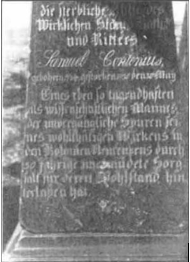
Kontenius’s tombstone in the cemetery in the Lutheran village
of Josephstal near Ekaterinoslav.[13]
As for his family, Pyotr Alekseevich was the son of Lieutenant-General Alexis Hahn von Rottenstim Hahn, who belonged to a noble family from Mecklenburg, Germany, that settled in Russia.[14] The elder Hahn was appointed commandant of the Kamenets-Podolsk fortress in 1801 and remained in this post for the remainder of his life. Pyotr Alekseevich’s mother, Elizaveta Maksimovna, was also of noble blood, belonging to the Estonian house von Pröbsting. His parents had eight children, four of whom fought in the Patriotic War (the other four were too young.) The senior Hahn also served but died from illness in 1814 before reaching the front.[15] Widowed with eight children, Elizaveta Maksimovna married a second time to Nikolay Vasilyevich Vasilchikov, a hero of the Patriotic War, and brother of Prince Illarion Vasilyevich.[16]
Andrei Mikhailovich and Elena Pavlovna reluctantly agreed to their daughter’s marriage because of her early youth, but they eventually consented. “I have experienced many times in my life,” Andrei Mikhailovich would say, “that what is determined by Providence cannot be prevented in any way.”
After Kontenius’s funeral, Andrei Mikhailovich went to Bessarabia at the call of Inzov, who wanted to know everything about the interview with Count Zakrevsky. The poor old man was upset, but given the weakness of his character, he did not have the determination to do anything about it. On the way back from
Bessarabia, Andrei Mikhailovich was detained at Dniester on the road from Chisinau. Due to the outbreak of plague, he was forced to quarantine for ten days, during which time he overcame his boredom by reading the ten volumes of Casanova’s memoirs.[17]
At the time a silent killer was stalking the Russian cities of the north. Towards the end of the summer of 1830 the formidable stranger known as Cholera appeared at the fair of Nizhni Novgorod. It quickly inspired fear in Moscow. Prince Golitsyn, the military Governor General of Moscow, immediately established quarantines at the limits of his government, and at the barriers of the city. No one was permitted to enter his city without first undergoing the requisite fumigations. Every day Prince Golitsyn surrounded himself with the most eminent individuals of Moscow, and conferred with them to draft measures for public safety A temporary chief was appointed over each of the twenty quarters of Moscow who corresponded directly with Prince Golitsyn who, himself, selected a certain number of persons inhabiting his quarter for his assistance. A temporary hospital was established in every quarter, the medical service of which was entrusted to an inspecting physician (under whose orders other medical men, and medical pupils of the University and the Imperial Academy, were distributed.) These inspecting physicians formed a temporary medical council that held daily meetings. Succor was promptly given to every house under their directions, and every proprietor of a house was strictly enjoined to immediately communicate to the police the slightest suspicion of the manifestation of this disease (whose symptoms were published for the information of all.) Carriages were provided for every quarter for the immediate transport of the sick to the hospitals. The authorities and citizens of Moscow appeared to have devoted themselves to the perfecting of arrangements of containment with the utmost zeal and discretion. Within two weeks the whole detail of administration was complete. Scarcely was it completed, however, when, on September 15, 1830, the dreaded disease disclosed itself when an individual of the lower class died of it. The Cholera epidemic had begun in Russia.[18]
-
- NOVOROSSIYA
- The Arbiter Of Europe’s Destiny.
- The House Dolgorukuy
- Madame Krüdener
- Ekaterinoslav
- The Arabat Arrow
- The Mystery Of General Inzov
- The Doukhobors
- Pushkin
- Chuguev Military Settlement
- “The Blessed”
- The Decembrists
- Penza
- Independence
- Last Words Of Samuel Khristianovich Kontenius
- “Amid Coffins And Desolation”
- Rusalka
- Dead Souls
- Secret Passages
- Astrakhan
- Nevsky Prospekt
- Kalmyk Ulus
- Love And Ambition
- Duellistes
- Pyatigorsk
- A Heroine Of Our Time
- Winter Palace
- Zeneida R-Va
- Steppes
- Letter To Natalya
- Fire And Ice
SOURCES:
[1] Nekrasova, E. S. “Helena Andreyevna Hahn (1814-1842): Part I.” Russkaia Starina. Vol. LI, No. 8 (August 1886): 335-354; Nekrasova, E. S. “Helena Andreyevna Hahn (1814-1842): Part II.” Russkaia Starina. Vol. LI, No. 9 (September 1886): 553-574; Zhelikhovskaya, Vera Petrovna. “Helena Andreyevna Hahn (1835-1842.)” Russkaia Starina. Vol. LII, No. 3 (March 1887): 733-766.
[2] Stroganova, Evgeniia. “The Writing Experience As Emotional Trauma: The Case Of Elena Andreevna Gan.” in (eds.) Rytkönen, Marja; Kurkijärvi, Kirsi; Chowaniee, Urszula; Phillips, Ursula. Mapping Experience In Polish And Russian Women’s Writing. Cambridge Scholars Publishing. Newcastle upon Tyne, England. (2010): 50-63.
[3] Fadeyev, Andrei Mikhailovich. Vospominaniia: 1790-1867: Vol. I. Vysochaishe Utverzhd. Yuzhno-Russkago. Odessa, Ukraine. [Russian Empire.] (1897): 102
[4] Hahn, Helena Andreyevna. The Complete Works Of Zeneida R-Va: Vol. I. N. O. Mertz. St. Petersburg, Russia. (1905): 138-209. (“Jellaledin.”)
In a letter to Natalya Kuzovleva in 1839, Hahn writes: “Your letter reminded me of a happy past, when we climbed the cliff to the high tower—I described this magical place in Jellaledin.” [“Letter From E. A. Hahn To Natalya P. Dated January 10, 1839. [Kamenskoye Village, Ekaterinoslav Province.]” [Preparation of the text and comments by A.D. Tyurikov. Bahmut Roerich Center. Originally published in: Gershenzon, M.O. “Russian Woman Of The ‘30s.” Russian Thought. Vol. XII, C. 55 (December 1911.)]
[5] Nekrasova, E. S. “Helena Andreyevna Hahn (1814-1842): Part I.” Russkaia Starina. Vol. LI, No. 8 (August 1886): 335-354.
[6] Carlson, Maria. “No Religion Higher Than Truth.” A History Of The Theosophical Movement In Russia, 1875-1922. Princeton University Press. Princeton, New Jersey. (1993): 15-16.
[7] Zhelikhovskaya, Vera Petrovna. Fantastic Stories. A. S. Suvorin. St. Petersburg, Russia. (1896): 44-45.
[8] “The New Year In Russia.” All The Year Round. Vol. VIII, No. 194 (January 10, 1863): 423-425.
[9] Nekrasova, E. S. “Helena Andreyevna Hahn (1814-1842): Part I.” Russkaia Starina. Vol. LI, No. 8 (August 1886): 335-354.
[10] Fadeyev, Andrei Mikhailovich. Vospominaniia: 1790-1867. Vysochaishe Utverzhd. Yuzhno-Russkago. Odessa, Ukraine. [Russian Empire.] (1897): Part I: 45, 104-107.
[11] Blavatsky, Helena P. Collected Writings Volume I (1874-1878.) Theosophical Publishing House. Wheaton, Illinois. (1966): xxv-lii. [Boris de Zirkoff’s biography of Blavatsky.]
[12] “About Spiritualism: An Interview With Madame Blavatsky.” The Daily Graphic. (New York, New York) November 13, 1874; From a draft of Chapter II in Vera Petrovna Zhelihovskaya’s “Radda Bai.” (1892) [Bakhmut Roerich Society]; Nekrasova, E. S. “Helena Andreyevna Hahn (1814-1842): Part I.” Russkaia Starina. Vol. LI, No. 8 (August 1886): 335-354; Zhelihovskaya, Vera Petrovna. How I Was Little. A. F. Devrien. St. Petersburg, Russia. (1898): 3.
[13] Samuel Kontenius, by then a Senator, died 30 May 1830 in Ekaterinoslav. He was buried in the cemetery of the small Lutheran village Josephstal near Ekaterinoslav.” [Huebert, Helmut T. Mennonites In The Cities Of Imperial Russia: Vol. II. Springfield Publishers. Winnipeg, Canada. (2008): 143.]
[14] Griffiths, Allan. “Madame H.P. Blavatsky.” The New Californian. Vol. I, No. 1 (June 1891): 22-25; Reitemeyer, Frank. “Open Questions In H. P. Blavatsky’s Genealogy.” Fohat. Vol. X, No. 2 (Summer 2006): 35-37.
[15] Markelova, L.K. “Notes On The Genealogy Of E.P. Blavatsky: Part III: Major General Alexey Fedorovich Hahn And The Fate Of His Family.” Interregional Information And Analytical Center. (2020.)
[16] Fadeyev, Andrei Mikhailovich. Vospominaniia: 1790-1867. Vysochaishe Utverzhd. Yuzhno-Russkago. Odessa, Ukraine. [Russian Empire.] (1897): Part I: 107.
[17] Fadeyev, Andrei Mikhailovich. Vospominaniia: 1790-1867. Vysochaishe Utverzhd. Yuzhno-Russkago. Odessa, Ukraine. [Russian Empire.] (1897): Part I: 107.
[18] Hawkins, Francis Bisset. History Of The Epidemic Spasmodic Cholera Of Russia. John Murray. London, England. (1831): 1-3.


